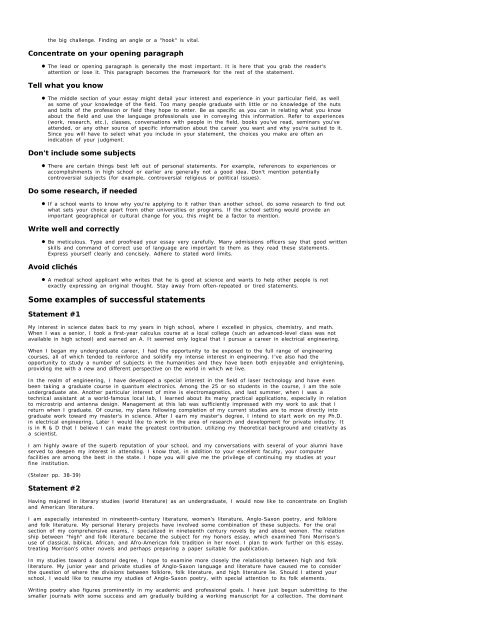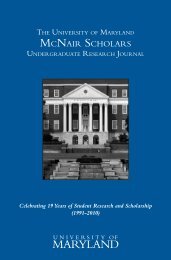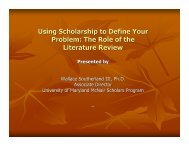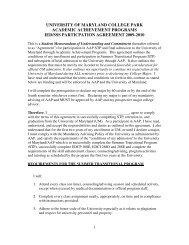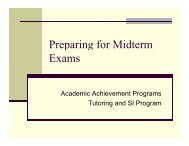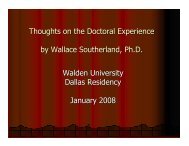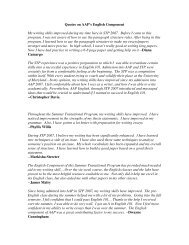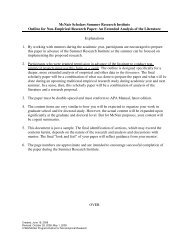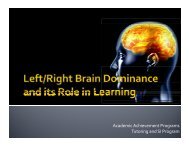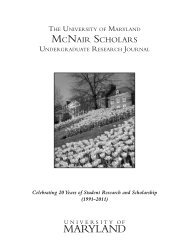Writing the Personal Statement - Academic Achievement Programs
Writing the Personal Statement - Academic Achievement Programs
Writing the Personal Statement - Academic Achievement Programs
Create successful ePaper yourself
Turn your PDF publications into a flip-book with our unique Google optimized e-Paper software.
<strong>the</strong> big challenge. Finding an angle or a "hook" is vital.<br />
Concentrate on your opening paragraph<br />
The lead or opening paragraph is generally <strong>the</strong> most important. It is here that you grab <strong>the</strong> reader's<br />
attention or lose it. This paragraph becomes <strong>the</strong> framework for <strong>the</strong> rest of <strong>the</strong> statement.<br />
Tell what you know<br />
The middle section of your essay might detail your interest and experience in your particular field, as well<br />
as some of your knowledge of <strong>the</strong> field. Too many people graduate with little or no knowledge of <strong>the</strong> nuts<br />
and bolts of <strong>the</strong> profession or field <strong>the</strong>y hope to enter. Be as specific as you can in relating what you know<br />
about <strong>the</strong> field and use <strong>the</strong> language professionals use in conveying this information. Refer to experiences<br />
(work, research, etc.), classes, conversations with people in <strong>the</strong> field, books you've read, seminars you've<br />
attended, or any o<strong>the</strong>r source of specific information about <strong>the</strong> career you want and why you're suited to it.<br />
Since you will have to select what you include in your statement, <strong>the</strong> choices you make are often an<br />
indication of your judgment.<br />
Don't include some subjects<br />
There are certain things best left out of personal statements. For example, references to experiences or<br />
accomplishments in high school or earlier are generally not a good idea. Don't mention potentially<br />
controversial subjects (for example, controversial religious or political issues).<br />
Do some research, if needed<br />
If a school wants to know why you're applying to it ra<strong>the</strong>r than ano<strong>the</strong>r school, do some research to find out<br />
what sets your choice apart from o<strong>the</strong>r universities or programs. If <strong>the</strong> school setting would provide an<br />
important geographical or cultural change for you, this might be a factor to mention.<br />
Write well and correctly<br />
Be meticulous. Type and proofread your essay very carefully. Many admissions officers say that good written<br />
skills and command of correct use of language are important to <strong>the</strong>m as <strong>the</strong>y read <strong>the</strong>se statements.<br />
Express yourself clearly and concisely. Adhere to stated word limits.<br />
Avoid clichés<br />
A medical school applicant who writes that he is good at science and wants to help o<strong>the</strong>r people is not<br />
exactly expressing an original thought. Stay away from often-repeated or tired statements.<br />
Some examples of successful statements<br />
<strong>Statement</strong> #1<br />
My interest in science dates back to my years in high school, where I excelled in physics, chemistry, and math.<br />
When I was a senior, I took a first-year calculus course at a local college (such an advanced-level class was not<br />
available in high school) and earned an A. It seemed only logical that I pursue a career in electrical engineering.<br />
When I began my undergraduate career, I had <strong>the</strong> opportunity to be exposed to <strong>the</strong> full range of engineering<br />
courses, all of which tended to reinforce and solidify my intense interest in engineering. I've also had <strong>the</strong><br />
opportunity to study a number of subjects in <strong>the</strong> humanities and <strong>the</strong>y have been both enjoyable and enlightening,<br />
providing me with a new and different perspective on <strong>the</strong> world in which we live.<br />
In <strong>the</strong> realm of engineering, I have developed a special interest in <strong>the</strong> field of laser technology and have even<br />
been taking a graduate course in quantum electronics. Among <strong>the</strong> 25 or so students in <strong>the</strong> course, I am <strong>the</strong> sole<br />
undergraduate ate. Ano<strong>the</strong>r particular interest of mine is electromagnetics, and last summer, when I was a<br />
technical assistant at a world-famous local lab, I learned about its many practical applications, especially in relation<br />
to microstrip and antenna design. Management at this lab was sufficiently impressed with my work to ask that I<br />
return when I graduate. Of course, my plans following completion of my current studies are to move directly into<br />
graduate work toward my master's in science. After I earn my master's degree, I intend to start work on my Ph.D.<br />
in electrical engineering. Later I would like to work in <strong>the</strong> area of research and development for private industry. It<br />
is in R & D that I believe I can make <strong>the</strong> greatest contribution, utilizing my <strong>the</strong>oretical background and creativity as<br />
a scientist.<br />
I am highly aware of <strong>the</strong> superb reputation of your school, and my conversations with several of your alumni have<br />
served to deepen my interest in attending. I know that, in addition to your excellent faculty, your computer<br />
facilities are among <strong>the</strong> best in <strong>the</strong> state. I hope you will give me <strong>the</strong> privilege of continuing my studies at your<br />
fine institution.<br />
(Stelzer pp. 38-39)<br />
<strong>Statement</strong> #2<br />
Having majored in literary studies (world literature) as an undergraduate, I would now like to concentrate on English<br />
and American literature.<br />
I am especially interested in nineteenth-century literature, women's literature, Anglo-Saxon poetry, and folklore<br />
and folk literature. My personal literary projects have involved some combination of <strong>the</strong>se subjects. For <strong>the</strong> oral<br />
section of my comprehensive exams, I specialized in nineteenth century novels by and about women. The relation<br />
ship between "high" and folk literature became <strong>the</strong> subject for my honors essay, which examined Toni Morrison's<br />
use of classical, biblical, African, and Afro-American folk tradition in her novel. I plan to work fur<strong>the</strong>r on this essay,<br />
treating Morrison's o<strong>the</strong>r novels and perhaps preparing a paper suitable for publication.<br />
In my studies toward a doctoral degree, I hope to examine more closely <strong>the</strong> relationship between high and folk<br />
literature. My junior year and private studies of Anglo-Saxon language and literature have caused me to consider<br />
<strong>the</strong> question of where <strong>the</strong> divisions between folklore, folk literature, and high literature lie. Should I attend your<br />
school, I would like to resume my studies of Anglo-Saxon poetry, with special attention to its folk elements.<br />
<strong>Writing</strong> poetry also figures prominently in my academic and professional goals. I have just begun submitting to <strong>the</strong><br />
smaller journals with some success and am gradually building a working manuscript for a collection. The dominant


